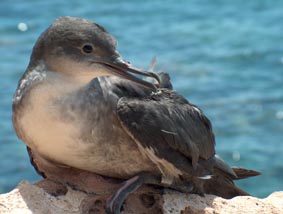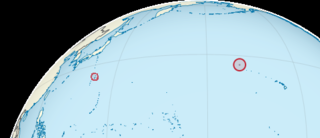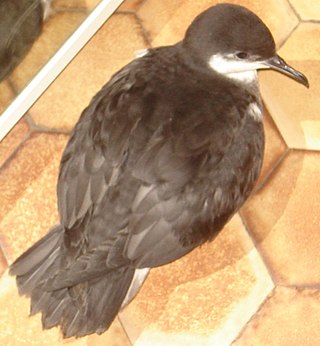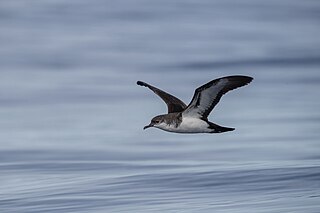
Shearwaters are medium-sized long-winged seabirds in the petrel family Procellariidae. They have a global marine distribution, but are most common in temperate and cold waters, and are pelagic outside the breeding season.

The Balearic shearwater is a medium-sized shearwater in the seabird family Procellariidae. Puffinus is a Neo-Latin loanword based on the English "puffin" and its variants, that referred to the cured carcass of the fat nestling of the Manx shearwater, a former delicacy. The specific mauretanicus refers to Mauretania, an old name for an area of North Africa roughly corresponding to Morocco and Algeria. The Balearic Shearwater is listed critically endangered by the IUCN and is one of Europe’s most endangered seabirds.

Cory's shearwater is a large shearwater in the seabird family Procellariidae. It breeds colonially of rocky islands in the eastern Atlantic. Outside the breeding season it ranges widely in the Atlantic. It was formerly considered to be conspecific with Scopoli's shearwater.

The little shearwater is a small shearwater in the petrel family Procellariidae. Despite the generic name, it is unrelated to the puffins, which are auks, the only similarity being that they are both burrow-nesting seabirds.

The yelkouan shearwater, Levantine shearwater or Mediterranean shearwater is a medium-sized shearwater in the seabird family Procellariidae. It was formerly treated as a subspecies of the Manx shearwater.

The Christmas shearwater or ʻaoʻū is a medium-sized shearwater of the tropical Central Pacific. It is a poorly known species due to its remote nesting habits, and it has not been extensively studied at sea either.

Rapa, also called Rapa Iti, or "Little Rapa", to distinguish it from Easter Island, whose Polynesian name is Rapa Nui, is the largest and only inhabited island of the Bass Islands in French Polynesia. An older name for the island is Oparo. The total land area including offshore islets is 40.5 km2 (15.6 sq mi). As of the 2017 census, Rapa had a population of 507. The island's highest point is at 650 metres (2,130 ft) elevation at Mont Perahu. Its main town is Ahuréi. The inhabitants of Rapa Iti speak their own Polynesian language called the Rapa language.

Audubon's shearwater is a common tropical seabird in the petrel family. Sometimes known as the dusky-backed shearwater, the specific epithet honours the French naturalist Félix Louis L'Herminier.

The short-tailed shearwater or slender-billed shearwater, also called yolla or moonbird, and commonly known as the muttonbird in Australia, is the most abundant seabird species in Australian waters, and is one of the few Australian native birds in which the chicks are commercially harvested. It is a migratory species that breeds mainly on small islands in Bass Strait and Tasmania and migrates to the Northern Hemisphere for the boreal summer.

Townsend's shearwater is a rare seabird of the tropics from the family Procellariidae.

The flesh-footed shearwater is a medium-sized shearwater. Its plumage is black. It has pale pinkish feet, and a pale bill with a distinct black tip. Together with the equally light-billed pink-footed shearwater, it forms the Hemipuffinus group, a superspecies which may or may not have an Atlantic relative in the great shearwater. These large shearwaters are among those that have been separated into the genus Ardenna. Recent genetic analysis indicates evidence of strong divergence between Pacific colonies relative to those in South and Western Australia, thought to be explained by philopatry and differences in foraging strategies during the breeding season.

The Barolo shearwater, also known as the North Atlantic little shearwater or Macaronesian shearwater, is a small shearwater which breeds in the Azores and Canaries of Macaronesia in the North Atlantic Ocean. The English name and the specific baroli refers to Carlo Tencredi Falletti, marquis of Barolo.

Newell's shearwater or Hawaiian shearwater (ʻaʻo), is a seabird in the family Procellariidae. It belongs to a confusing group of shearwaters which are difficult to identify and whose classification is controversial. It was formerly treated as a subspecies of the Manx shearwater and is now often placed in Townsend's shearwater. It is endemic to the Hawaiian Islands.
The Rapa fruit dove is a species of bird in the family Columbidae, which includes pigeons and doves. It is endemic to the island of Rapa Iti in French Polynesia. The species was classified as Critically Endangered by the IUCN Red List in 2018 because of its small population and predicted continued decline. The Rapa fruit dove primarily feeds on fleshy fruit. Its natural habitat is subtropical or tropical moist lowland forests and it has an extent of 30 km2. It is threatened by habitat loss due to deforestation and invasive species. Effective land protection and management could increase the quality of habitat for the species. Additional research into population dynamics and the impact of threats to the species can give a better understanding of the conservation practices needed.

Bryan's shearwater is a species of shearwater that may occur around the Hawaiian Islands. It is the smallest species of shearwater and is black and white with a bluish gray beak and blue tarsi. First collected in 1963 and thought to be a little shearwater it was determined using DNA analysis to be distinct in 2011. It is rare and possibly threatened and there is little information on its breeding or non-breeding ranges. The species is named after Edwin Horace Bryan Jr. a former curator of the B. P. Bishop Museum at Honolulu.

The tropical shearwater is a seabird in the family Procellariidae formerly considered conspecific with Audubon's shearwater.

Bannerman's shearwater is a seabird in the family Procellariidae formerly considered conspecific with Audubon's shearwater.
















